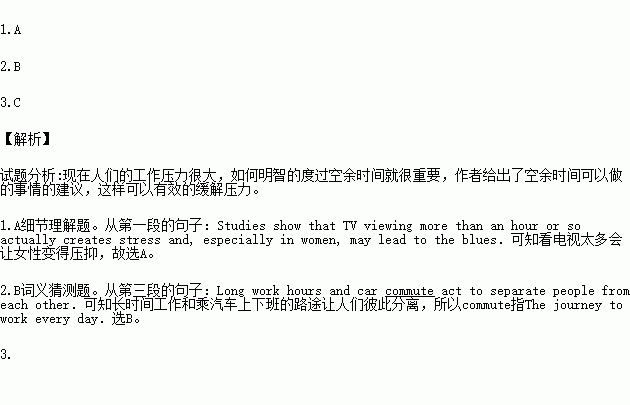题目内容
In today's fast paced,high stress world people are working longer hours than ever,and often exhaust themselves at day's end in front of the television to relax enough to begin again in the morning. However,television watching,for most people,does not really lower stress. Studies show that TV viewing more than an hour or so actually creates stress and,especially in women,may lead to the blues. Most individuals are unaware that doing some exercise after work makes them more energetic since it increases energy levels.
Wise use of free time does not mean getting an advanced degree,although the mental encouragement gained through education is unbeatable in keeping your mind active. Learning new things nearly always adds a spark to your daily life,especially if it is a favorite topic,such as sport,fashion,or art. Also,look through your bookstore or library to find books on your interests. Try to replace a half hour TV watching with reading.
It is reported that in the United States recently,many individuals have as few as two good friends. Long work hours and car commute act to separate people from each other. This separation is deadly. Find ways to meet people at the end of the day and on weekends. Often this can be best done by combining activities,such as by joining a walking group to get both exercise and companionship. Taking a class will lift your spirits and allow you to meet others with similar interests. Hobbies are great for reducing stress and provide another opportunity for social interaction.
Using your free time to aid your health may include these elements and many more,such as going to concerts and spending time with family. Overall,the key is to spend less free time being passive. The best ways to use free time are to be mentally and physically active,spend some time outdoors,and interact with other people on a regular basis.
1.What can we learn from the passage?
A. Watching television may cause women to feel depressed.
B. Finding interests and hobbies in common means taking a class.
C. Going to concerts is the best way to make you mentally active.
D. Getting an advanced degree in education always lights up your life.
2.What does the underlined word “commute” in Paragraph 3 probably mean?
A. The arrangement to work every day.
B. The journey to work every day.
C. The communication between people.
D. The separation between people.
3.Which would be the best title for the passage?
A. Live a Happy and Healthy Life
B. Relax Yourself in Various Ways
C. Spend Your Free Time Wisely
D. Interact With Others Outdoors

